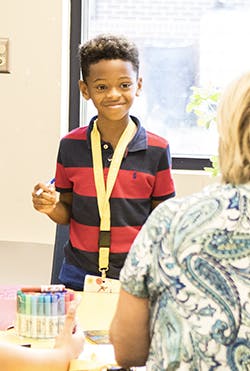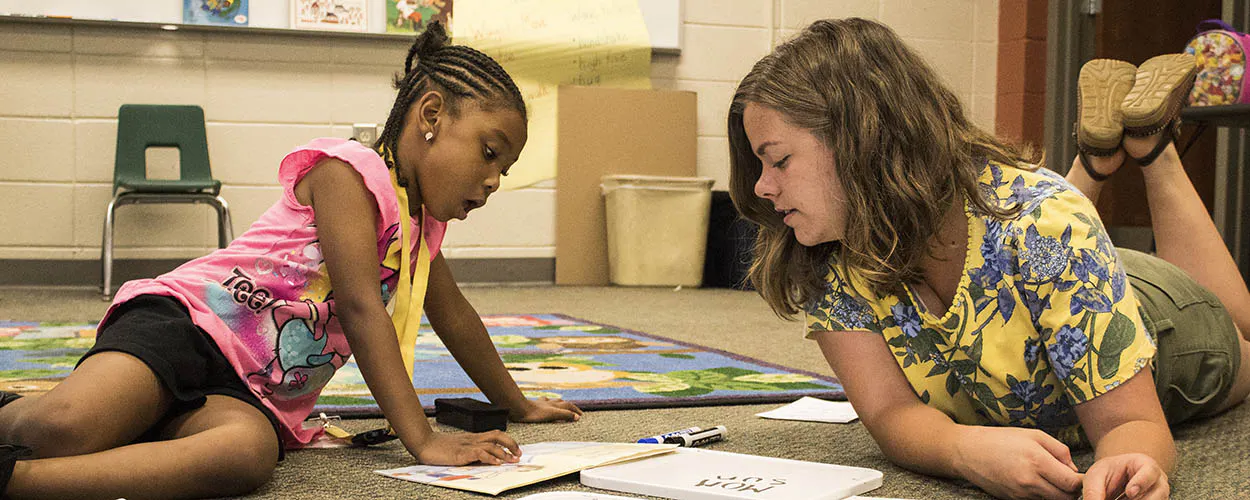Camp DIVE's 3rd year lets kids and teachers get creative
Writing on your paper isn't as much fun as squishing it.
Which is why, on a recent morning at Clarke Middle School, a table of early readers pounded and smushed blobs of Play-Doh until they were flat. Then, they got to work writing down their new words.
"One of the things we're getting to do is experiment with experiences they don't get to do during the school year," said Dera Weaver, an adjunct professor leading the class of kids in kindergarten through second grade, along with graduate student assistants. Those experiences included writing new words in things like rice and clay, or using dry-erase boards. The impermanence each medium provides allows the children to feel less worried about making mistakes, and as a result, they play more with letters and words.
The lesson is one of many that took place during the month of June as part of Camp DIVE, an annual summer learning experience for about 80 children in Clarke County Schools in grades kindergarten through eighth. The camp covers several bases; for children, it keeps them learning and exploring during the summer and the low child-to-adult ratio, about three to one, assures a positive, personalized classroom experience. For the UGA students who are helping teach the children, it's an opportunity to learn new teaching skills and also get course credit. For the faculty and Clarke County School District teachers involved in the camp, it's an opportunity to explore new lesson plans and pass on techniques to future teachers.
New this year were junior counselors, or high school students who had aged out of the traditional camp experience but wanted to come back and continue to be involved.
 "It's amazing to see the kids who want to come back; we have hardly any who don't want to return," said Megan Tipton, a Clarke County teacher who helped faculty in the University of Georgia College of Education first develop the concept for Camp DIVE four years ago, when she was a graduate student. Today the camp is in its third year and represents a partnership between the College of Education, which provides the funding, staff and administrative support, and the school district, which provides the building and food for the children.
"It's amazing to see the kids who want to come back; we have hardly any who don't want to return," said Megan Tipton, a Clarke County teacher who helped faculty in the University of Georgia College of Education first develop the concept for Camp DIVE four years ago, when she was a graduate student. Today the camp is in its third year and represents a partnership between the College of Education, which provides the funding, staff and administrative support, and the school district, which provides the building and food for the children.
"We have junior counselors now coming back to work with the kids, and that's what we wanted," Tipton added. "All of the camp's goals are equally important, but I wanted kids to see learning in a different light. And we are seeing that is the case—they are getting to do stuff that is enriching and strip away all the anxiety from the school year and see it as fun. It's just amazing."
All the lessons revolved around literacy skills in some way, but the topics and how they were taught changed depending on the age of the students. For example, while the youngest students worked with clay, wrote books and played word games with puppets, children in third through fifth grades investigated animals that could be found in the Athens area. They studied habitats and how people and the landscapes affect them, then built dioramas and created reports on what they found. Their literacy lessons were infused with science, social studies, map skills and habitat awareness.
At the end of the hall, the middle school group talked about nutrition, where our food comes from, the ideas of food deserts, budgeting and community activism through a lesson centered on the West Broad School. Now home to a community garden, the students took a field trip there, discussed the community around the garden and access to food, then came back to the classroom and read proposals that were submitted to the school board for the property's future.
Then, each student decided which proposal they liked the best and drafted a letter to the school board outlining their reasons why.
The lesson was a collaboration between two graduate students, Jordan Henley, a doctoral student in science education, and Chasity James, a doctoral student in educational theory and practice. James, who has degrees in agricultural education, blended her ideas with Henley's passion for social justice. The result was a wide-ranging list of topics that covered general classroom topics and then some: Mathematics for creating and using a food budget; social studies and history in learning about the West Broad school property; science in nutrition and learning how plants grow—and growing them at home.
"Clarke Middle School has the garden, and I wanted to bring that education to the students," said James, while both explained how agriculture could easily bleed into other areas of instruction. "So, nutrition is science, gardening and agriculture is science-based," added Henley. "While the literacy is in reading the proposals and writing the letters."
Camp DIVE also draws from the expertise of nonprofits and others throughout the Athens community. For example, campers traveled to Canopy Studio twice a week for aerial lessons. A book club for the middle-grades campers, led by Clarke Middle School's media specialist, linked social issues with speakers from the community who are working to find solutions to these problems. And each Friday, students took field trips.
One field trip was to the Georgia Museum of Art, where the middle-school group wandered the galleries with instructors to find a piece of art that inspired them. Using worksheets, they wrote down words and phrases provoked by the piece, constructed a poem using these ideas, then created a presentation for the camp's final day that could include music, their own artwork, or a spoken word performance.
Again, faculty and teachers found a way to draw literacy into an afternoon of art.
Not only do the lessons at Camp DIVE help expand the children's world, but they also give current and future teachers new classroom experiences. For example, UGA students working with the youngest learners at camp also got to learn about ways to assess a child's abilities simply by observing them tackle a problem or lesson.
Master's student Perrin Aycock said it's a great technique that can be used by teachers throughout the year to check in on students' progress without relying on a test. Or, if a student arrives in a classroom in the middle of a year, it helps a teacher understand what concepts they've mastered.
"The kids don't know they're being assessed," said Weaver, who teaches the graduate-level teacher education class tied to the morning literacy lessons. In the afternoon, the graduate students meet as a class to go over the techniques they're learning. "Our students leave with an idea of how to assess their students on the ground. This is designed to show them what they can do in the classroom."
